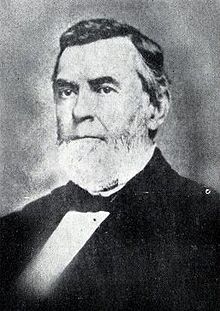Thomas Bragg
Thomas Bragg (* 9. November 1810 in Warrenton in Warren County , North Carolina ; † 21st January 1872 in Raleigh , North Carolina) was an American politician, temporary Minister of Justice of the Confederate States of America and the elder brother of the general of the Confederate Army , Braxton Bragg .
Origin and career
Thomas Bragg was the son of the trained carpenter and building contractor Thomas and his wife Margaret Crossland-Bragg. After attending Warrenton Academy and Captain Partridge's Military Academy in Middletown , Connecticut , he was admitted to the bar in 1833. That same year he opened a law firm in Jackson , North Carolina and married Isabelle M. Cuthbert in October 1837.
Political career
Bragg was elected to the state's parliament in 1842 and 1844 for the Democratic Party . In 1845 he served as the district attorney for Northampton County . As governor of North Carolina from 1855 to 1859 and as a US Senator , he was a Conservative secessionist who did not believe the South could establish its independence. When North Carolina seceded, he resigned as a US Senator in 1861. As governor, however, he also promoted the country's infrastructure, especially the railroad. He supported both agriculture and industry and further expanded the country's education system. That led to his re-election as governor in 1856.
Secession period
When the civil war broke out, Bragg was appointed advisor to the governor of North Carolina. As Attorney General in the Confederate Cabinet of Jefferson Davis from November 21, 1861 to March 18, 1862, he was a confidante of the President . He defended civil rights and stated that the Confederate government was responsible for all materials required by the military. He carefully reorganized the ministry so that it could be more responsive to the needs of the state. When the Confederate Supreme Court was built, he was envisaged as a possible judge. Bragg resigned from his post on March 18, 1862, to return to North Carolina, where he would try to stop the peace movement that had existed there since 1862. He also sought reconciliation between the Confederate President and the Governor of North Carolina, Zebulon Vance . In 1864 he helped publish the former unionist State Journal . Until the end of the war he served Confederate interests and obtained the takeover of newly established branches from US-owned into the hands of the southern states.
post war period
After the war ended in 1865, Bragg returned to his legal practice in Raleigh. He helped reorganize the state government during the 1860s. He was also a prosecutor in the trial of Governor William Woods Holden . He died on January 21, 1872 in Raleigh and was buried there in Oakwood Cemetery .
literature
- Jon L. Wakelyn: Biographical Dictionary of the Confederacy Louisiana State University Press, Baton Rouge ISBN 0-8071-0092-7
- Robert Sobel and John Raimo (Eds.): Biographical Directory of the Governors of the United States, 1789–1978. Volume 2, Meckler Books, Westport, Conn. 1978, 4 volumes
Web links
- Thomas Bragg in the Biographical Directory of the United States Congress (English)
- Thomas Bragg in the National Governor Association (English)
- Thomas Bragg in the database of Find a Grave (English)
| predecessor | Office | successor |
|---|---|---|
| Wade Keyes |
Minister of Justice of the Confederate November 21, 1861 - March 18, 1862 |
Thomas Hill Watts |
| personal data | |
|---|---|
| SURNAME | Bragg, Thomas |
| BRIEF DESCRIPTION | American politician |
| DATE OF BIRTH | November 9, 1810 |
| PLACE OF BIRTH | Warrenton (North Carolina) , Warren County , North Carolina |
| DATE OF DEATH | January 21, 1872 |
| Place of death | Raleigh , North Carolina |


